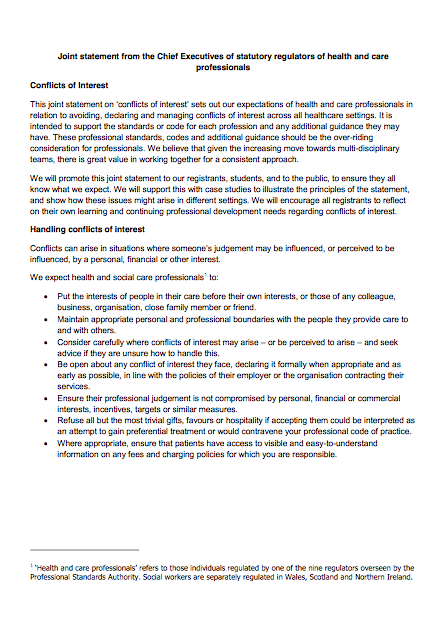GPhC signs joint statement on conflict of interest guidelines
In News
Follow this topic
Bookmark
Record learning outcomes
Transparency and openness around potential conflicts of interest will strengthen community pharmacy's reputation, the Royal Pharmaceutical Society has told P3 in response to a joint statement from regulators looking at how the issue be dealt with.
The comment from the RPS came as the General Pharmaceutical Council joined other healthcare regulators in signing a statement setting out how conflicts of interest should be avoided, declared and managed across all healthcare settings.
Among the expectations outlined, the joint statement says healthcare professionals should €refuse all but the most trivial gifts, favours or hospitality€ if accepting them could be seen as an attempt to gain preferential treatment or could go against their professional code of practice.
The statement also includes the following expectations of healthcare professionals:
- Put the interests of people in their care before their own interests or those of any colleague or organisation
- Consider where potential conflicts of interest may arise and be open about them
- Be open about, and declare, any conflicts of interest they face
- Reflect on their own learning and CPD needs regarding conflicts of interest
- Ensure patients have access to visible information on any fees or charging policies for which they are responsible.
Case studies
The regulators have also published case studies to illustrate these principles. GPhC worked with the General

Medical Council and the Pharmaceutical Society of Northern Ireland to produce a case study scenario involving a private practice GP whose employer has told her to encourage patients to take their prescriptions to a pharmacy it has bought recently. This could also apply to a range of healthcare professionals who may have a direct or indirect financial interest in another business, GPhC says.
GPhC chief executive Duncan Rudkin said: €As health and care regulators, we share a commitment to collaborating on issues that affect patient safety and care, and the trust they place in the professionals who provide that care. By working closely with our fellow regulators, we are underlining the consistent expectations of health professionals in managing conflicts of interest, to help give patients and the public the assurance that their interests will always be put above any other interest a health professional may have.
€The joint statement supports the principles and guidance outlined in our standards for pharmacy professionals, and I hope the statement and case studies will provide helpful insight for our registrants when facing potential conflicts of interest.€
'If in doubt, find out'
When contacted by P3, the Royal Pharmaceutical Society offered this advice for pharmacists: €There are well known concerns about actual and potential conflicts of interest across the NHS. If you are ever in doubt about whether you should declare a conflict or how to do it, find out. Transparency and openness will enhance the reputation of pharmacy and pharmacists and assure professional integrity and public confidence, while enabling collaborative working and constructive dialogue with suppliers of goods and services to the NHS.€
A professional guide on identifying and appropriately making declarations of interest is available to RPS members.
